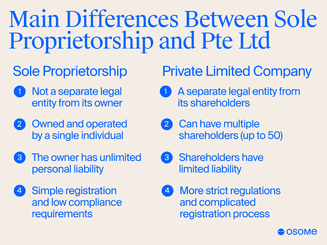Sole Proprietorship vs Pte Ltd: The Best Choice in Singapore
- Modified: 19 December 2024
- 7 min read
- Starting a Company


Gabi Bellairs-Lombard
Author
Gabi's passionate about creating content that inspires. Her work history lies in writing compelling website copy and content, and now specialises in product marketing copy. When writing content, Gabi's priority is ensuring that the words impact the readers. As the voice of Osome's products and features, Gabi makes complex business finance and accounting topics easy to understand for small business owners.
Entering the world of entrepreneurship in Singapore? The first stepping stone is choosing the right business structure. It’s like selecting the right vehicle for a long journey. The choice between a sole proprietorship vs Pte Ltd could steer the course of your business voyage, dictating its pace and how bumpy the ride might be.
Key Takeaways
- A Sole Proprietorship and a Private Limited Company differ in legal structure, ownership, liability, citizenship requirements, registration and compliance and capital raising options.
- Converting a Sole Proprietorship to Pte Ltd requires obtaining a no-objection letter from the authorities before constituting the company.
- Business income tax liabilities for sole proprietorships range from 2-22%, while Pte Ltds have access to tax exemptions and rebates with a 17% corporate income tax rate.
What Is a Sole Proprietorship?
A sole proprietorship is a business structure where the owner, also known as the sole proprietor, and the business are considered the same legal entity. The owner has complete control over business operations and is personally responsible for all liabilities. This structure is known for its simplicity and straightforwardness, making it a popular choice for individuals starting their own business.
However, owning this type of business comes with significant risks. The owner’s personal assets can be used to cover business losses, as the structure involves unlimited liability. Despite the potential challenges, this option appeals to those seeking simplicity and minimal compliance requirements.
What Is a Private Limited Company?
A Private Limited Company (Pte Ltd) is a business structure that is distinct from its owners, offering legal liability protection and a formalised business framework. The company and its owners are separate entities, meaning that if the company faces challenges, the owners’ personal assets are protected.
Setting up a private limited company can be advantageous in terms of raising capital by increasing the number of shareholders and accessing grants and rebates. However, this structure comes with more stringent compliance requirements, underscoring the need for a competent team to manage regulatory obligations effectively.
Main Differences Between a Sole Proprietorship and Pte Ltd
Deciding between a sole proprietorship and a private limited company involves careful consideration. The choice depends on key differences in:
- Legal business structure
- Ownership
- Liability
- Citizenship requirements
- Business registration and compliance
- Capital raising options

Legal Structure
Within the scope of legal structure, a sole proprietorship vs Pte Ltd company comparison showcases significant differences, much like comparing a boat and a ship. A sole proprietorship and its owner constitute a single legal business entity, whereas a Pte Ltd company stands apart as a separate legal identity from its owners.
The private limited company framework provides legal advantages like
- Legal liability protection
- The ability to form contracts
- Continuity
- The capacity to draw external investors
These features make a private limited company a more robust and secure business structure compared to a sole proprietorship.
Ownership
Ownership is another key difference between a sole proprietorship and a private limited company (Pte Ltd). A sole proprietorship is owned and operated by a single individual, whereas a private limited company has multiple shareholders and exists as a separate legal entity, distinct from personal assets and resources.
The involvement of multiple shareholders in a private limited company provides greater capital flexibility. The company can raise additional funds by issuing shares or borrowing from banks and financial institutions, making it a more scalable business structure.
Liability
The liability structure of a sole proprietorship business structure, including business liabilities, is akin to a sailor’s personal risk in a storm. The owner's personal assets are at risk if the business cannot fulfil its debts incurred.
On the other hand, private limited companies, which is a type of limited liability company, offer limited liability to their shareholders, similar to a limited liability partnership. The individual assets of the company’s proprietors are protected from the company’s debts and liabilities.
Citizenship
Regarding citizenship requirements for sole proprietorships - only local citizens, permanent residents, or EntrePass holders are eligible to register a sole proprietorship.
Regarding the private limited companies, foreigners are allowed to own shares in a Pte Ltd, thus expanding the range of potential investors.
Registration and compliance
Sole proprietors in Singapore have fewer compliance requirements than private limited companies.
Conversely, a private limited company requires more preparations before it can set sail. It must appoint a company secretary and submit annual returns to the Accounting and Corporate Regulatory Authority.
Capital raising
Securing capital can pose challenges due to limited credibility. However, a private company has easier access to bank loans and investors as it has a separate legal identity from its other attributes. With its solid reputation and structure, it can attract more resources.
How To Convert Sole Proprietorship to a Pte Ltd
The transformation from a sole proprietorship to a Pte Ltd necessitates several steps. First, you’ll need a no-objection letter to keep the business name and verify that the proprietor is allowing the usage of the name for the new private limited company.
Following that, you must constitute the private limited company, shift all business assets, and discontinue the sole proprietorship. From there you start ticking the boxes that constitute a private limited company structure.
Converting from a sole proprietorship to a private limited company involves securing permission to retain your business name, establishing the new company, and transferring assets. This transition marks a shift to a more structured business model, offering greater growth potential and legal protection.
What Are the Tax Liabilities for Sole Proprietorships and Private Limited Companies?
While steering through the business waters, another aspect to ponder is tax liabilities. The tax rate for a sole proprietorship in Singapore can range from 2% to 22%.
Conversely, private limited companies are liable to a 17% corporate income tax rate. However, it comes with available tax exemptions and rebates.
When deciding between a sole proprietorship and a private limited company, consider not only the tax rates but also the opportunities for tax planning. A private limited company offers more flexibility in managing deductions and accessing tax incentives, which can help reduce your overall tax burden as your business grows. A sole proprietorship may have simpler taxes, but its potential for tax relief is more limited, making it less ideal for scaling.
Summary
Choosing the right business structure — either a sole proprietorship or a private company — is crucial in navigating the business seas. Each has its merits and drawbacks, and the choice largely depends on the size of your venture, risk tolerance, and future plans. The choice depends on your needs and goals. At Osome, our business experts can help you choose the best business structure so you're incorporated for success and compliance.






